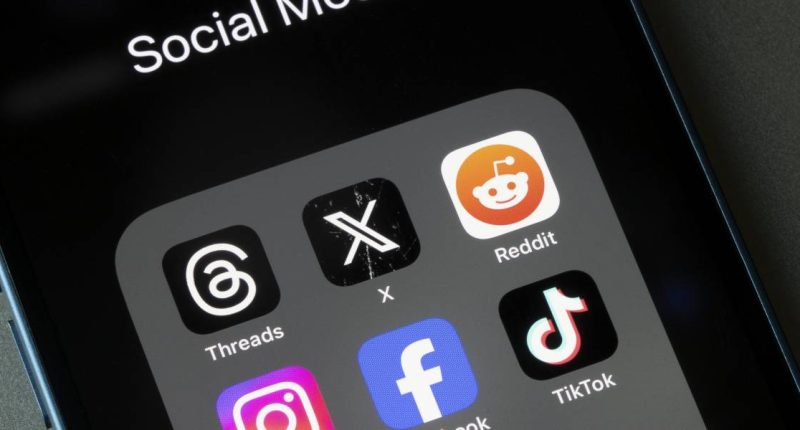Inaccurate health advice circulating on TikTok can be dangerous if users avoid getting professional medical treatment, a GP with a huge social media following has said.
Dr Idrees Mughal, who himself has 1.8 million followers on TikTok, is urging people not to use the social media platform for trusted health advice, after it was revealed that roughly six million Brits use the app for accessing health information.
He has estimated that 97% of the posts he sees on TikTok are filled with incorrect information, leading people to following inaccurate health advice.
Dr Mughal said: “People are looking for genuine science-based evidence and they just get drawn in.
- Egg diet trending on TikTok labelled dangerously restrictive
- Harmful copies of popular weight-loss drugs are being sold on TikTok amid medication shortage
- TikTok influencer describes weight gain after quitting Ozempic
“The platform also shows all sorts of crazy things which prey on anxiety and fear-mongering. At best the videos can be pointless and money wasting, at worst they can negatively impact someone’s wellbeing.”
Athena Lamnisos, chief executive officer of the gynaecological cancer charity The Eve Appeal, said: “Posts that are trying to sell you something – a lot of gynae health misinformation being spread on TikTok involves ads to convince young women they need to buy something to fix a problem they don’t have.”
In a post that has been viewed more than eight million times, TikTok star Taylor Brook is encouraging her followers to pour hydrogen peroxide into their ear canal in a bid to clean out ear wax.
Dr Andrew Camilleri, consultant ear, nose and throat surgeon at South Manchester Foundation Trust, said: “I wouldn’t recommend this. This could lead to serious pain, inflammation and even damage to your hearing.”
Another trend going viral online is seeing people trying to treat insomnia by eating chicken cooked in a sauce of the cold and flu remedy NyQuil.
Michael Oko, consultant ear, nose and throat surgeon at United Lincolnshire Hospitals Trust and head of sleep apnoea services for Lincolnshire, said: “This is such a stupid idea; medication should be used as regulated and indicated on the packet.
“There’s a risk of exceeding the dosage. And when you start cooking a drug, you don’t know how much that changes the nature of the medication.”
Clea Harmer, chief executive of Sands, a charity supporting parents whose babies have died, said: “Social media platforms can be a helpful source of support for anyone affected by pregnancy or baby loss.
“However, it can also be easy for misinformation about health in pregnancy to spread on social media, and influencers are rarely health professionals.”
Health advice on TikTok has said that it is normal for babies not to move in the final weeks of pregnancy because they are resting before being born.
Clea said: “It’s a myth. In pregnancy, babies’ movements are a sign of their health. If your baby’s pattern of kicks and movements changes, contact your midwife or maternity unit for immediate advice.”
Eddie Crouch, chair of the British Dental Association, said: “From tutorials on fashioning DIY braces out of elastic bands, paperclips and superglue, to brushing with sawdust, dentists are picking up the pieces from trends that can result in lasting damage to teeth and gums.”
- Khloe Kardashian denies using diabetes drug for weight loss after TikTok posts sparked shortages
- Negative diet culture and unrealistic body images promoted on TikTok, study suggests
- TikTok influencer describes weight gain after quitting Ozempic
Sam Jethwa, a dentist and vice president of The British Academy of Cosmetic Dentistry, is highly concerned after TikTok videos emerged which encourage people to file their teeth with a nail file to reduce ridges.
Sam said: “This is extremely dangerous – it can damage the enamel, leading to sensitivity and increasing the risk of decay.
“There is the chance of filing the tooth too much so that nerve endings become exposed, which can cause pain, irritation and may lead to infection. A nail file is not a sterile dental tool and holds a lot of bacteria, nor is it designed for teeth.”
GP Dr Rachel Ward said: “Just because someone calls themselves a specialist it doesn’t mean they are.”
Dr Mughal said: “If they say things like ‘this is the worst food you can eat’ then that kind of absolutist claim shows a lack of awareness of nuance or context.
“Look out also for people who allude to ‘science’ to add authority but don’t reference studies. They are using the credibility of science without science: that’s a red flag.”
A TikTok spokesperson said: “TikTok works with accredited fact-checkers to assess content, and when harmful medical misinformation is found, we immediately remove it from our platform.”




